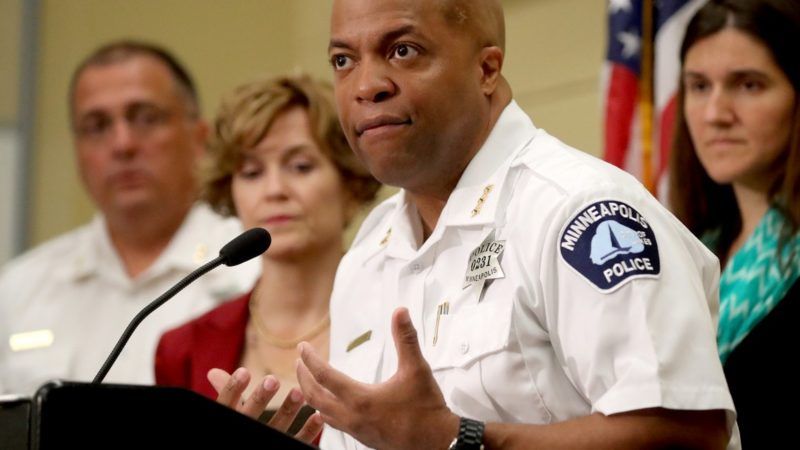Minneapolis Police Chief Ends Contract Negotiations With Police Union
After George Floyd’s death, the city will bring in outside advisers to recommend changes to make policing more transparent and accountable.

Minneapolis' police chief said Wednesday he was withdrawing the city from contract negotiations with the union representing local officers in order to bring in outside advisers to analyze the contract for potential reforms.
"This is not about employees' benefits, or wages, or salaries," Chief Medaria Arradondo said. "But this is further examining those significant matters that touch on such things as critical incident protocol, our use of force, the significant roles that supervisors play in this department, and also the discipline process, to include both grievances and arbitration.
"There is nothing more debilitating to a chief, from an employment perspective, than when you have grounds to terminate an officer for misconduct, and you're dealing with a third-party mechanism that not only allows that employee to be back on your department, but to be patrolling in your communities."
Arradondo was referring to collective bargaining agreements between police unions and their municipalities that make it extremely hard for departments to fire bad cops. Union-mandated appeal practices have time and time again either shielded cops from discipline entirely or returned them to the force after they've been fired as a result of binding arbitration processes. Derek Chauvin, the fired Minneapolis police officer now facing third-degree murder and manslaughter charges in Floyd's death, had a history of complaints filed against him, two of which resulted in discipline, including a letter of reprimand.
Arradondo noted that the police department will also be implementing an as-yet-defined mechanism to analyze data about officer performance to try to catch officers engaging in problem conduct early on in order to intervene. He was short on the details but noted that part of the problem departments have been having with efforts to catch and adjust police officers' behavior has been supervisors' failure to respond. Supervisors simply aren't acting on their own to address officers' conduct. So this data-driven system is intended to force a reaction or response when cops misbehave.
This announcement does not suggest that Arradondo supports the Minneapolis City Council members who want to defund or completely dismantle or rethink the city's entire police department. It's not his call, though, and he responded to a question from a reporter about the push to defund police by saying he wasn't planning to step down anytime soon. "Until there is a robust plan that ensures the safety of our residents," he said, "I will not leave them."
Arradondo is taking direct aim here at the Police Officers Federation of Minneapolis. Its president, Lt. Bob Kroll, is taking heat from all quarters for his public response to Floyd's death, dismissing him as a "violent criminal" and referring to protesters as terrorists, even as other police unions across the country have condemned Chavin's behavior.
The city's police contract expired at the end of 2019 but remains in force until a new one is negotiated.
When asked directly whether Kroll should resign, Arradondo deflected somewhat, saying "there's going to have to be some decisions made, moving forward" about union leadership, adding that the two of them have been having regular conversations.
As always, when we talk about police reforms, the devil will be in the details. Arradondo said there will be additional press conferences in the coming days and weeks. Arradondo may be presenting the carrot here, attempting to convince the union to embrace these reforms, while the City Council presents the stick—the possibility that Minneapolis may follow the example of Camden, New Jersey, and completely eliminate its local police department (and union) and then start over with county law enforcement.


Show Comments (59)